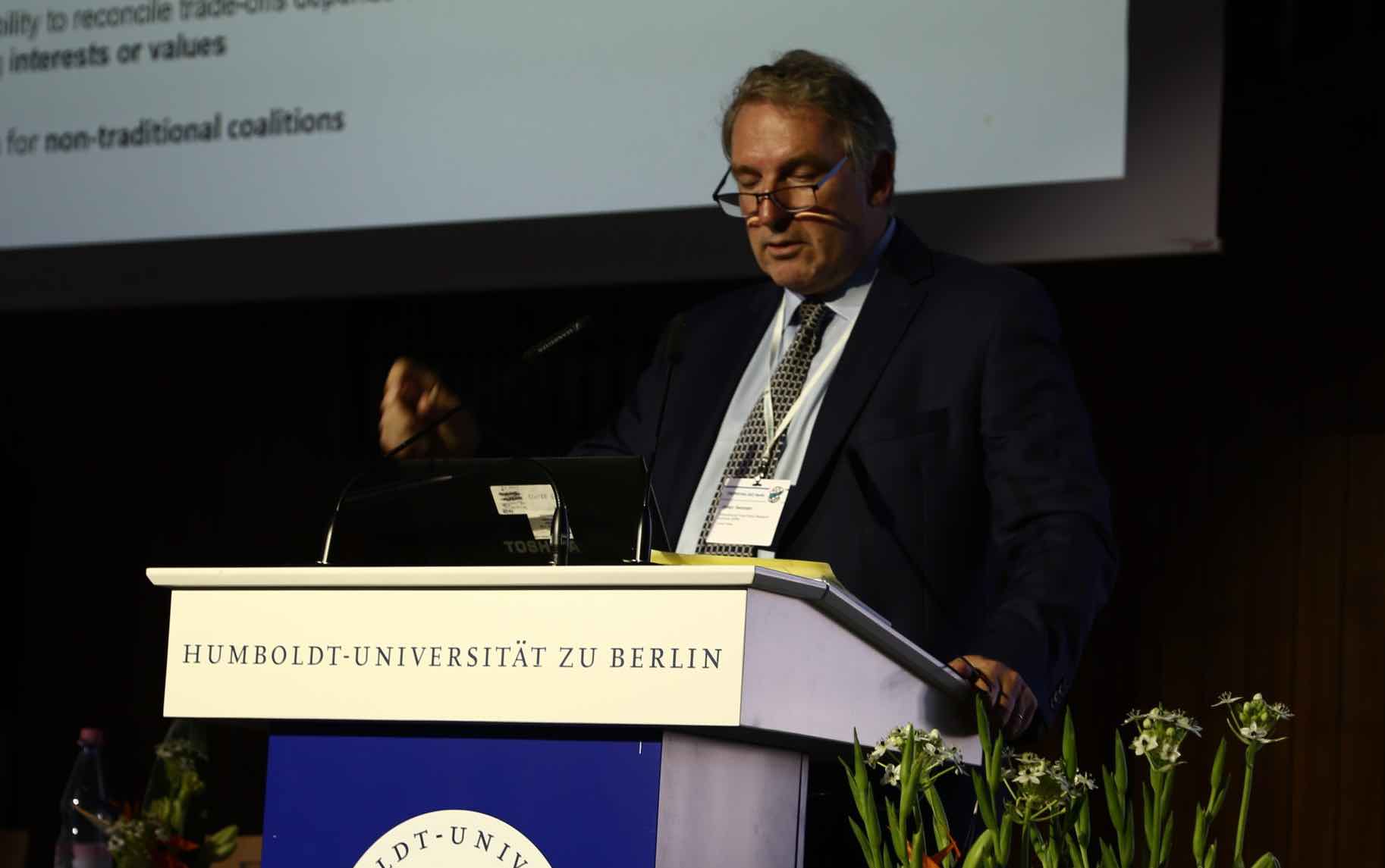The challenges posed by geopolitical conflicts, extreme weather events, and economic shocks are not to be underestimated. Around the world, hundreds of millions of people struggle with inadequate access to food, and tens of millions are forcibly displaced, and these numbers have been on the rise. Meanwhile, it’s crucial to recognize that malnutrition takes various forms, including micronutrient deficiencies and problems such as obesity. Alarmingly, the incidence of both of the conditions is also rising.
These are among the challenges contributing to the recent halt in the decline of world hunger, IFPRI Director General Johan Swinnen noted in his keynote speech at the Tropentag 2023 conference in Berlin on September 20. This year’s conference, organized by the Leibniz Centre for Agricultural Landscape Research (ZALF), in cooperation with Humboldt-Universität zu Berlin, focused on the theme “Competing pathways for equitable food systems transformation:
trade-offs and synergies.”
To address these challenges effectively, Swinnen said, it’s essential to build more resilient food systems. This will help people better prepare for and respond to shocks, ensuring that they have access to the food they need. CGIAR aims for enhanced food systems resilience to address the likelihood of more shocks in the future.
Increasing resilience
Several key strategies come into play in enhancing resilience, Swinnen said:
- Climate mitigation (prevention): The first step is preventing shocks whenever possible. Climate mitigation efforts are critical in reducing the frequency and severity of climate-related challenges.
- Digital innovations (monitoring): Leveraging digital innovations and early-warning systems allow us to keep a vigilant eye on potential threats.
- Absorbing shocks (resilience): When shocks do occur, having mechanisms in place to cushion the blow is essential. These include insurance, financial strategies, and social safety nets.
Also important, Swinnen said, is ensuring that these measures are inclusive, reaching every segment of society. Learning from successes and noting areas for improvement are equally important in this process, he said, as well as directing more attention to vulnerable groups such as women and poor urban communities.
Small steps towards big changes
As policymakers work toward transforming food systems, Swinnen said, they must consider the complexity involved; rather than pursuing one-size-fits-all solutions, efforts should be directed toward tailored, niche solutions that address specific challenges effectively.
Institutional innovations and policy interventions are essential components of this journey. In a world driven by technological advancements and innovation, it’s crucial to consider the user’s perspective, Swinnen said. Are the innovations accessible and being utilized to their full potential? Policy frameworks can play a pivotal role in incentivizing users and providing support to those who may face challenges or setbacks as a result of economic or technological shifts. Science, too, can contribute by identifying and mitigating uncertainties related to risks and trade-offs, ultimately reducing resistance to the adoption of innovations.
The path forward, he said, involves careful consideration of whether to foster competition or promote complementarity in transformation strategies—a decision that goes beyond the individual level to the institutional one. Transformation requires a comprehensive package of solutions that encompass bundled innovations and strategies, driven by both economic and political considerations.
In essence, Swinnen said, achieving significant change requires a holistic approach, combining innovation, strategic thinking, and institutional support.
The role of science and the scientific community
During the keynote session, an audience member posed a question that resonated with the sentiments of the 1,200 participants in the room and scientists worldwide: Why aren’t policymakers heeding the advice of science and scientists? And, more importantly, what steps can we take to address this issue?
Swinnen noted a pivotal shift in the way information is disseminated and consumed. Undoubtedly, social media has become a prominent source of information for the majority of today’s society, he said, so it’s essential to recognize that information bias plays a significant role in shaping public perceptions of risks and influencing behaviors, with profound economic and political implications. To bridge this gap, he said, we must acknowledge this change in the informational landscape and the preferences of different segments of society, including decision-makers. Scientists must be prepared to engage effectively in these new media platforms that various groups within society, including policymakers, are using to access information and shape their perspectives.
Mary Grace Barbacias is an MS student at the University of Bonn and a consultant with the International Rice Research Institute. She is part of Tropentag 2023’s team of 12 student reporters, representing diverse backgrounds from across Europe. Through their camera lenses and pens, these reporters amplify the reach of scientific research and expert insights from the conference. Tropentag, an annual international conference established in 1997 and organized by ATSAF e.V. in collaboration with European universities, centers around research in tropical and subtropical agriculture and rural development (www.tropentag.de). This post also appears on the Tropentag blog.
This speech was part of the Keynote speeches and discussion during the first day of Tropentag 2023. Read more on this topic from IFPRI’s publication here on food system reform.







